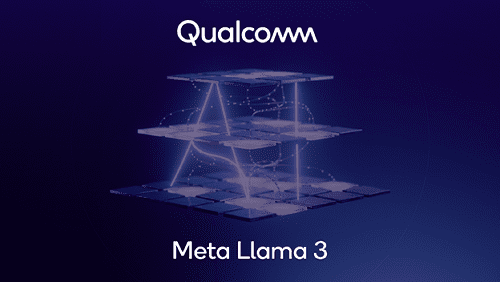- Qualcomm partners with Meta Platforms to integrate Llama 3 Large Language Model (LLM) into various devices.
- The aim is to democratize access to generative AI for on-device applications.
- Developers and equipment manufacturers can utilize Llama 3 via Qualcomm AI Hub.
- Benefits include enhanced responsiveness, privacy, reliability, and personalized user experiences.
- Durga Malladi from Qualcomm emphasizes the global expansion of the Llama ecosystem.
- Meta Platforms plans to evolve Llama 3 into a multilingual and multimodal framework.
- Collaboration extends to include the previous Llama 2 model.
Main AI News:
In a strategic move, Qualcomm has partnered with Meta Platforms to integrate its Llama 3 Large Language Model (LLM) into a variety of devices, spanning from VR headsets to smartphones and vehicles, all powered by the upcoming Snapdragon chipsets.
The partnership aims to democratize access to generative AI for on-device applications, emphasizing inclusivity and accessibility. Through the Qualcomm AI Hub, developers and equipment manufacturers will leverage Llama 3 to enhance user experiences across a spectrum of devices utilizing Qualcomm processors.
Qualcomm asserts that deploying Llama 3 on devices will yield substantial benefits, including heightened responsiveness, bolstered privacy measures, enhanced reliability, and personalized user experiences. This integration is poised to optimize application performance, fostering innovation and user engagement.
Durga Malladi, Senior Vice President and General Manager of Technology, Planning, and Solutions at Qualcomm, underscores the company’s commitment to advancing on-device AI. Malladi emphasizes Qualcomm’s role in extending the reach of the Llama ecosystem globally, empowering partners, developers, and customers to pioneer groundbreaking AI-driven experiences.
Meta Platforms heralds Llama 3 as its latest iteration of an open-source AI model, touting its superior performance across diverse industry benchmarks. Meta envisions evolving Llama 3 into a multilingual and multimodal framework, further expanding its utility and relevance in the AI landscape.
This collaboration builds upon a preexisting partnership between Qualcomm and Meta for the Llama 2 model, reflecting a shared commitment to innovation and technological advancement in the realm of on-device AI.
Conclusion:
Qualcomm and Meta’s collaboration signifies a pivotal shift in the on-device AI landscape, marking a concerted effort to democratize access to advanced AI capabilities. This partnership is poised to drive innovation, empower developers, and enhance user experiences across a diverse array of devices. The integration of Llama 3 into Qualcomm’s ecosystem underscores a strategic move towards fostering inclusivity and accessibility in the rapidly evolving AI market. As both companies continue to expand their technological footprint, the market can anticipate a surge in transformative AI-driven experiences tailored for on-device applications.

